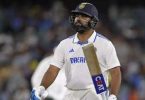The umpires had correctly ruled Angelo Mathews ‘timed out’ but the Sri Lankan batter could have avoided getting dismissed in that fashion by consulting the officials before asking for a new helmet, Marylebone Cricket Club, the custodian of the rules governing the game, said on Saturday.
Mathews had become the first batter to be dismissed ‘timed out’ in international cricket when he failed to take strike within the stipulated time of two minutes following the dismissal of Sadeera Samarawickrama in their World Cup match against Bangladesh on Monday, triggering a huge controversy.
Mathews realised that the strap of his helmet was broken and asked for a new helmet. The delay prompted Bangladesh to appeal and the umpires upheld it despite Mathews’ repeated pleas.
“When the helmet broke, it appears that Mathews did not consult with the umpires, which a player would be expected to do when seeking new equipment. Rather, he just signalled to the dressing room for a replacement,” the MCC said in a statement.
“Had he explained to the umpires what had happened and asked for time to get it sorted out, they might have allowed him to change the helmet, perhaps calling Time and thus removing any possibility of being Timed out.
“Given that Time had not been called, and that at the time of the appeal more than two minutes had elapsed, the umpires correctly gave Mathews out. In fact, there was no other action for the umpires to take within the Laws of Cricket,” the statement added.
South Africa’s Marais Erasmus and England’s Richard Illingworth were the two on-field umpires in that game.
A peeved Mathews had called Bangladesh’s decision to dismiss him via ‘time out’ “disgraceful”.
The two teams didn’t shake hands after the match on November 7.
Bangladesh skipper Shakib Al Hasan said he had no regrets about his decision to appeal, which he refused to withdraw even after beng asked by the umpires.
The MCC emphasised that such a law is certainly required because in its absence, “a batter could waste time at the fall of a wicket.” “This is particularly problematic in timed cricket, when the light may be fading and a draw a favourable result, but it is also relevant in limited overs cricket, where the fielding side is often punished for slow over-rates.
“Even if the intent is not specifically to waste time, a Law is required to keep the game moving and prevent significant delays between wickets.” The ICC also maintained that the Spirit of Cricket is not owned by any one player, country or culture and that the game is played with subtle differences right across the globe.
“…there will be frequent shades of grey in interpretation and not all scenarios can be foreseen and specifically codified. In these instances, it is the players who will ultimately determine how their game is to be played.”







